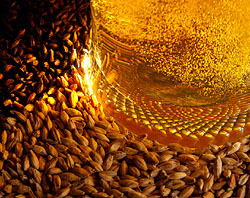 Beer is one of the most popular alcoholic beverages in the world, and it has innumerable health benefits. It is a rich source of magnesium, potassium, phosphorus, selenium, and the B complex group of vitamins. Because of the fact that it is loaded with nutrients, beer has earned the title of ‘liquid bread’.
Beer is one of the most popular alcoholic beverages in the world, and it has innumerable health benefits. It is a rich source of magnesium, potassium, phosphorus, selenium, and the B complex group of vitamins. Because of the fact that it is loaded with nutrients, beer has earned the title of ‘liquid bread’.
With the all-grain brewing method, beer is made directly from malted barley grain. No malt extract is used in this process. All the brew’s malty character comes from the barley, itself. Here are the basic steps:
- Milling: The first step is to crush the malted barley grain. This is done with a grain mill. All you are try to do it break up the outer husk of the grain. It is not necessary nor desirable to process it any more than this.
- Mashing: This consists of mixing the milled grain with hot water and letting it mash/steep. The natural enzymes that are in malted barley convert the starch which is present in the milled grains into fermentable sugar.
- Sparging: During this process, the sugars are rinsed out of the mash with the help of hot water. Batch sparging and continuous sparging are the two commonly used methods and each has its own pros and cons.
- Boil: Finally the wort is boiled in a brew kettle. Hops are added, which impart an element of bitterness. Beer hops neutralize the sweetness of the malt and make it taste slightly bitter. A wide range of beers are available on the market and the ones which are rich in hops having high alpha acids are comparatively bitter than the ones which have a low concentration of alpha acids.
- Fermentation: The wort is cooled down, and beer yeast is added, which ultimately transforms the wort into beer. The fermentation normally lasts about 5 days. The exception is when a lager beer yeast is used. Then the fermentation can potentially be drawn out for months.
- After The Fermentation: Once the fermentation is complete, the beer is packaged into kegs, casks, aluminum cans, or bottles etc. In the case of homebrew, beer bottles or soda canisters are the preferred norm.
Barley and wheat are the most commonly used brewing grains. However, other grains such as rye are also used in making beer and the flavor of the beer largely depends on the type of grain used.
________________________________________________________
Read More About All-Grain Brewing And Other Beer Topics,
FREE EMAIL NEWSLETTER:

